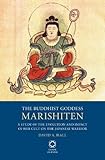The Buddhist goddess Marishiten : a study of the evolution and impact of her cult on the Japanese warrior / by David A. Hall.
Material type: TextPublisher: Leiden, Netherlands : Global Oriental, 2014Copyright date: ©2014Description: 1 online resource (367 pages) : illustrations (some color), photographsContent type:
TextPublisher: Leiden, Netherlands : Global Oriental, 2014Copyright date: ©2014Description: 1 online resource (367 pages) : illustrations (some color), photographsContent type: - 9789004252660
- 9004252665
- 294.3/42114 23
- BQ4750.M374 .H355 2014eb
- online - EBSCO
| Item type | Current library | Call number | URL | Status | Notes | Barcode | |
|---|---|---|---|---|---|---|---|
 eBook
eBook
|
Biblioteca "Angelicum" Pont. Univ. S.Tommaso d'Aquino Nuvola online | online - EBSCO (Browse shelf(Opens below)) | Online access | Not for loan (Accesso limitato) | Accesso per gli utenti autorizzati / Access for authorized users | (ebsco)650980 |
Includes bibliographical references and indexes.
Print version record.
The Buddhist Goddess Marishiten; Copyright; Dedication; Contents; Foreword; Preface; Acknowledgements; Abbreviations; Language Notes; List of Illustrations; Introduction: The Buddhist Warrior Goddess; 1. Mārīcī-The Warrior Goddess in India; 2. Molizhitian-The Warrior Goddess in China (Sixth Century) Discourse on the Incantation of the Goddess-Spell Mārīcī; 3. Molizhitian-The Warrior Goddess in China (Seventh Century) The Collected Dhāranī-sūtras; 4. Molizhitian-The Warrior Goddess in China (Eighth-Tenth Centuries); 5. Marishiten-The Warrior Goddess in Japan.
6. Marishiten and the Japanese Warrior7. Reflections on Mārīcī's Significance; Selected Bibliography; Indices and Character Glossaries; Chinese Index & Character Glossary; Japanese Index & Character Glossary; Sanskrit Index & Glossary; General Index; Index of Texts.
In 'The Buddhist goddess Marishiten', David A. Hall provides an in-depth exploration of the Buddhist cult of the warrior goddess Marici; its evolution in India, China, and Japan; its texts and their audience; its rituals; and, finally, its efficacy as experienced by the Japanese warrior class-the bushi or samurai. In examining the psychological effects of these rituals on the Japanese warrior this volume moves beyond a narrowly focused examination of a religious cult. David A. Hall convincingly explains how these rituals aimed at preparing the warrior for combat and acted as an antidote for the toxicity of Post-Traumatic Stress Disorder (PTSD) when the warrior returned from the battlefield.


